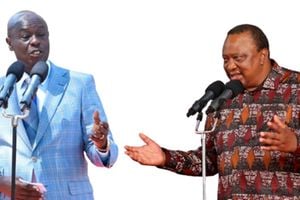‘Deep State’, rigging and other stories

Deputy President William Ruto fields questions from the audience at the Karson Institute for Race, Peace and Social Justice at Loyola University in Baltimore, Maryland, on March 2, 2022.
What you need to know:
- In Kenya, claiming that your victory has been stolen has an added advantage.
- It opens the door to a coalition government, popularly known as “nusu mkate” (half a loaf).
It is the one political takedown for which there are no comebacks from the mar. Former US President Donald Trump, the master political propagandist, undermined the legitimacy of his successor’s government, built a cocoon for himself against having to admit that he had lost and created a path to overthrow the democratic will of the people by stealing the election — not to mention creating the discontent which he hopes to ride into office in two years — merely by convincing voters that “Sleepy Joe” could not win an election, he could only steal one.
And like in vintage McCarthysm, you don’t really have to demonstrate with proof how the election was stolen; you just have to invoke the “Deep State”. And you don’t have to explain who Deep State is; it becomes a handy and convenient label for those who stand against you or challenge your methods.
A poll in December showed that only 27 per cent of Republicans believed Joe Biden legitimately won the presidential election; 94 per cent of Democrats did. A full 73 per cent of Republicans believed that President Biden stole the election; never mind that every specific claim has been debunked and/or thrown out of the courts.
Mr Trump’s claims — all wispy, flimsy and vaporous — played on the fears and prejudices of his followers, bringing foreigners, minorities and “Radical Left” into the picture knowing that this would persuade without the necessity of logic. And it did. This sort of large-scale manipulation is irresponsible but devastatingly effective.
'Nusu mkate' government
In Kenya, claiming that your victory has been stolen has an added advantage: It opens the door to a coalition government, popularly known as “nusu mkate” (half a loaf). It has been proven that taking the matters to the brink pays dividends by getting the presumed winner to agree to share power with the presumed loser rather than risk burning the country.
Am I saying that Kenyan elections are impossible to rig? Of course not. Am I saying that Kenyan elections have never been rigged? Certainly not. What I am saying is that the average Kenyan politician is still incapable of accepting political defeat and having to face oblivion, with the economic hardship it entails, for five years. And there is always the chance that the main crying wolf is doing so with good reason.
The Orange Democratic Movement (ODM) and the Coalition for Reforms and Democracy (Cord) made a consistent case against the Independent Electoral and Boundaries Commission and its predecessor that saw the sacking of the commission and to a large extent impeached its integrity. The complainants’ case was helped a great deal by the fact that the Supreme Court agreed there were “irregularities and illegalities” in the first round of the 2017 presidential poll, which it nullified.
Right from 2013, Jubilee was not just a coalition of two parties — United Republican Party (URP) and The National Alliance (TNA) — but, in some respects, came closest to forming a government of two sovereigns, a co-presidency of sorts, born out of similarities in political background, age and tribulations. The Cabinet was shared down the middle so each coalition leader appointed the ministers and to a large extent retained their loyalty and a big say in the decisions that the ministries made.
Who is rigging whom?
It is this political novelty that has contributed hugely to the emergence of the unique reality we have now of a dual incumbency, where the Deputy President is also the opposition presidential candidate and the Opposition candidate is supported by the government. Depending on how you view reality, this can be a good thing or a bad thing. You can choose to see it as a measure of our pragmatism and maturity — that politics is not personal, yesterday’s rival can be today’s friend. Or you can to see it as politics which is driven by instrumentalist instincts and not principle.
For me, it shows that our politicians are very persuasive and have a stronghold on the popular imagination and can lead us in whichever direction they choose. The fact that we follow uncritically explains why we are unable to hold governments, and leaders, to account.
Which brings me to the crux of the matter: So who is rigging whom? It is true that President Uhuru Kenyatta supports Mr Raila Odinga of Azimio for the presidency and that he controls the government and is, therefore, able to confer the benefits of incumbency on the latter. Similarly, as the co-principal since 2013, Dr William Ruto wields massive influence in government, including the bureaucracy which has many people that he appointed or brought into government, even though he and the President are no longer in good political terms. His costs are largely paid by the taxpayer. He is benefiting from incumbency as much as Mr Odinga, if not more.
The more corrosive acid which is sapping public confidence in democracy is the chorus of claims of rigging which undermine public trust in institutions and the resultant electoral outcome. We need to have a new standard in politics. You can’t just make claims of rigging; you must take the step of providing the evidence to back up your cries.





